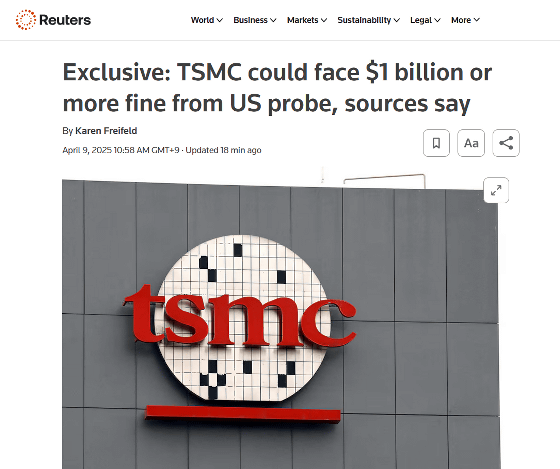TSMC may be fined more than 140 billion yen for using its chips in Huawei's AI processors

It has been revealed that chips manufactured by Taiwanese semiconductor manufacturer TSMC are used in AI processors manufactured by Chinese company Huawei, which is subject to U.S. export controls. In response, the U.S. Department of Commerce may impose a fine of more than $1 billion (approximately 146 billion yen) on TSMC, according to Reuters, a foreign media outlet.
Exclusive: TSMC could face $1 billion or more fine from US probe, sources say | Reuters
https://www.reuters.com/technology/tsmc-could-face-1-billion-or-more-fine-us-probe-sources-say-2025-04-08/

TSMC may face $1B+ penalty for suspected Huawei exports • The Register
https://www.theregister.com/2025/04/08/tsmc_blew_whistle_on_chinese/
TSMC faces $1 billion US fine for making chips for blacklisted Huawei | Tom's Hardware
https://www.tomshardware.com/tech-industry/tsmc-faces-usd1-billion-us-fine-for-doing-business-with-huawei
In the wake of the political and economic conflict with China, the United States has strengthened export controls on semiconductors and semiconductor manufacturing equipment to curb China's AI development. This extends to companies in other countries that use American technology, and TSMC is prohibited from exporting high-performance semiconductors to Chinese companies on the export control list.
However, in October 2024, it was discovered that chips manufactured by TSMC were used in the Huawei AI processor 'Ascend 910B,' which is subject to export controls.
It turns out that TSMC was manufacturing Huawei's AI chips, which could violate US export controls - GIGAZINE

Further investigation revealed that the TSMC chips used by Huawei were ordered by Chinese chipmaker SOPHGO , and TSMC reportedly stopped shipping products to SOPHGO as soon as it was discovered.
Immediately after it was reported that TSMC's semiconductors were used in Huawei's AI chips, TSMC stopped shipments to the Chinese company SOPHGO, and it is possible that SOPHGO was acting as an intermediary to make semiconductors - GIGAZINE

At the time TSMC received the order for SOPHGO, SOPHGO was not subject to US export controls, but in response to the series of events, the Department of Commerce added SOPHGO to the export control list.
The US adds 14 Chinese technology companies to its export control list, including SOPHGO, which sold TSMC semiconductors to Huawei - GIGAZINE

Now, Reuters has reported, citing two people familiar with the matter, that the Commerce Department could fine TSMC more than $1 billion, up to double the value of transactions that violated export controls.
According to Lennart Heim, a researcher at the RAND Corporation Center for Technology, Security and Policy, a US think tank that tracks China's AI development, TSMC produced about 3 million chips in response to SOPHGO's order. Heim said that TSMC should not have made chips for China-based companies, given the risk that they could be diverted to export-controlled companies like Huawei.
TSMC has announced that it will invest an additional $100 billion (approximately 14.6 trillion yen) in advanced semiconductor manufacturing operations in Arizona, USA, in March 2025. However, in April, President Donald Trump said , 'If TSMC does not build a factory in the United States, I will tax it up to 100%.'
A Commerce Department spokesman declined to comment to Reuters, but Secretary of Commerce Howard Lutnick said at a conference in Washington in March, 'We intend to seek a dramatic increase in enforcement and penalties for those who break the rules,' signaling stronger enforcement of export control controls. Jeffrey Kessler, who was appointed head of the Commerce Department's Bureau of Industry and Security in March, also touched on the TSMC and Huawei issues at a February confirmation hearing, saying the reports were a 'major concern' and that 'strong enforcement' was important.
TSMC spokeswoman Nina Kao said in a statement that the company is committed to complying with the law, has not supplied products to Huawei since mid-September 2020, and is working with the US Department of Commerce.
Related Posts:
in Note, Posted by log1h_ik





